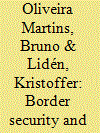| Srl | Item |
| 1 |
ID:
189654


|
|
|
|
|
| Summary/Abstract |
Aiming at analysing all major security risks to a country, comprehensive National Risk Assessments (NRAs) can be used as a foundation for national security policies. Doing so manifests a modernist dream of securing societies through the anticipatory governance of risks. Yet, this dream resembles a nightmare of undemocratic state control in the name of security. Based on a critique of the politics of NRAs, this article offers a theoretical framework for evaluating their scientific and political credentials. Drawing on political theory of technocratic expert rule, ethical criteria of epistemic reliability and political representation are introduced to the debate. These criteria are then applied to an analysis of the NRAs of Sweden, Denmark, Finland, Norway and Iceland. I argue that although these NRAs are convincing correctives to the risk perceptions of politicians and civil society, they are insufficiently reliable and representative for defining the scope and priorities of national security policies at large.
|
|
|
|
|
|
|
|
|
|
|
|
|
|
|
|
| 2 |
ID:
187083


|
|
|
|
|
| Summary/Abstract |
The European Union’s effort at controlling its external borders is an endeavour that increasingly relies on digital systems: from tools for information gathering and surveillance to systems for communicating between different agencies and across member states. This makes EU borders a key site for the politics of “digital sovereignty” – of controlling digital data, software and infrastructures. In this article, we propose a new understanding of how the concepts of digital and sovereignty interplay: sovereignty by digital means, sovereignty of the digital, and sovereignty over the digital. We do it by analysing three key manifestations within the EU’s borderwork: firstly, the expansion of EURODAC to include facial biometric data; secondly, the creation of the (future) shared Biometric Matching System (sBMS); and thirdly, the EU-funded West Africa Police Information System (WAPIS). These databases and systems exemplify three transformations of EU borderwork that invoke different dimensions of digital sovereignty: expansion of techniques for governing migration; interoperability of EU databases facilitating the internalisation of borders through domestic policing; and extra-territorialization of borderwork beyond the geographic limits of the EU.
|
|
|
|
|
|
|
|
|
|
|
|
|
|
|
|